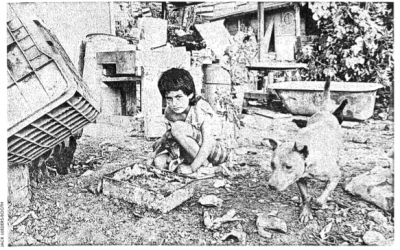Democracy and Difference
Midwives and Market Vendors in Juchitan, Mexico

Wedding celebration in family courtyard.
What animates struggles for social justice and makes democratization possible? The southern Mexican city of Juchitán offers the paradoxical lesson that difference and disruption can foster the establishment of multifaceted democracy. Democracy occurred in Juchitán not because Western cultural and economic practices proceeded apace there, but because the outside was kept out in significant ways in the twentieth century and Zapotec Indians mobilized politically at the borders of violence.
A Zapotec political movement, the Coalition of Workers, Peasants, and Students of the Isthmus, or COCEI, has governed Juchitán since 1989. COCEI administers social welfarefunds for the city of 100,000 with widely acknowledged efficiency, promotes Zapotec language and culture, and mobilizes poor people around pressing economic issues.COCEI secured this right to govern through fifteen years of militant grassroots activism that combined direct action mobilizations with electoral participation. As a result of its opposition to the Mexican regime, COCEI faced brutal killings and military occupation. Since 1989, in contrast, Mexican authorities have respected the results of elections in Juchitán, invested in municipal services, and curbed human rights abuses, outcomes that are particularly noteworthy in light of decades of polarized conflict in nearby Chiapas and Central America.
COCEI’s political mobilizations have been accompanied by extensive Zapotec cultural and artistic elaboration. Since the 1920s, Juchitecos have practiced and reinvented Zapotec painting, literature, music, dress, and ritual practice, interacting with and borrowing from national and international artistic currents. Zapotec market women and businesspeople have similarly engaged the outside with margins of success unusual in poor regions of Mexico. In the course of these cultural and economic interactions, Juchitecos have disagreed vehemently among themselves about how much of the outside to embrace and on what terms.

Above and to left Zapotec women in their courtyards.
In this context, COCEI’s internal characteristics and its role as governing party have been tempestuous and contradictory. As a non-violent movement, it has incited turbulence and threat. While claiming to be democratic, it has limited dissent and reached internal decisions non-democratically, while at the same time reinvigorating electoral competition for public office. As municipal administration, it has paved streets and installed drainage honestly and transparently, while neglecting to develop new leadership and forward-looking economic programs.
Juchitán suggests that democracy arises through mobilization and threat and that movements for social justice may combine, and indeed be animated by, both praiseworthy and negative characteristics. The interaction between Zapotec culture and Western democratic discourse has (re)produced difference and and conflict and also brought about unprecedented democratic innovation. The autonomy of Zapotec culture and the ability of Juchitecos to interact with the outside from a position of relative strength were key ingredients in these transformations.
Spring 1998
Jeffrey W. Rubin received his Ph.D. in the Government Department at Harvard. He is a Member of the School of Social Science at the Institute for Advanced Study in Princeton, New Jersey. These photographs appear in his recent book Decentering the Regime: Ethnicity, Radicalism, and Democracy in Juchitán, Mexico, published by Duke University Press.
Related Articles
The Social Agenda in Latin America
If the 1980s were the era of economic policy reform in Latin America, the 1990s have become the era of social sector reform. Indeed, a consensus is now forming that delivery of health care…
A Mellon Update
More than 23 Latin American archives and libraries from Mexico to Rio de Janeiro have received grants from the Andrew W. Mellon Foundation to upgrade or preserve their facilities. The…
From Havana to HUD
Kennedy School Assistant Professor Xavier de Souza Briggs, who took a group of 17 graduate public policy students on a one-week study tour of Cuba last year, has now embarked on…




